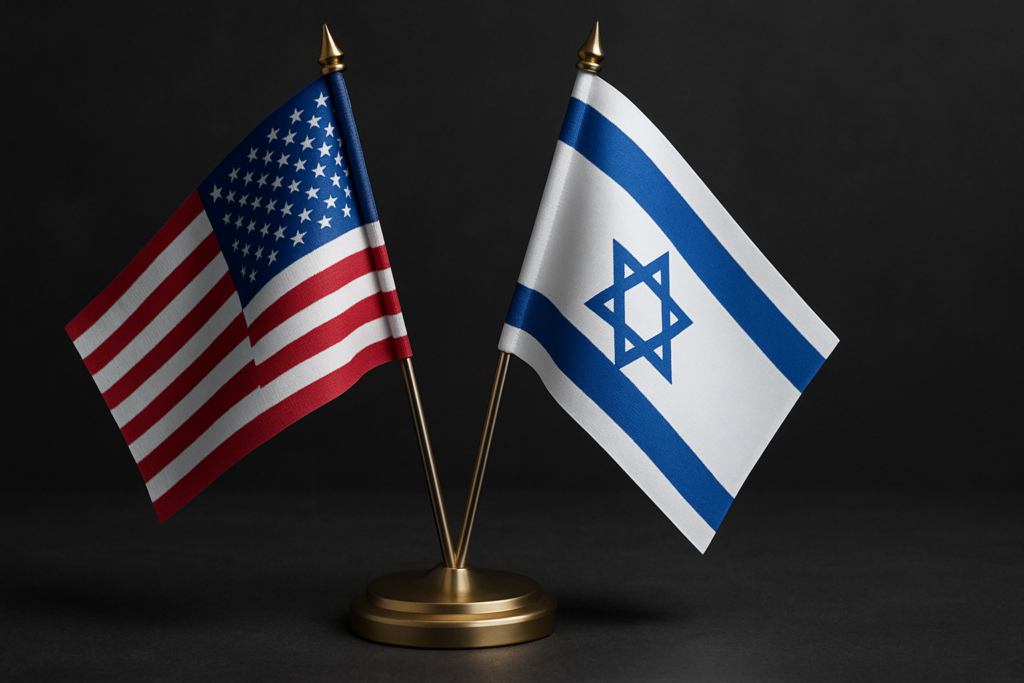
A Relationship Too Special to Question
Since the founding of Israel in 1948, the United States has played the role of benefactor, partner, shield, and sometimes even enabler. Over the decades, this relationship has been presented to the public as a “strategic alliance” grounded in mutual interests. Yet, scratch the surface and the story quickly becomes murky. The U.S. sends billions of dollars in military aid annually to Israel, vetoes nearly every resolution critical of its actions at the United Nations, and bends foreign policy positions in favour of Tel Aviv — often at the expense of American standing in the wider Arab and Muslim world.
To ask whether this is truly a two-way street or a one-sided arrangement is not anti-Semitic. It is a fair question for anyone who wishes to examine how global power functions, how public money is used, and how alliances are shaped by pressure rather than principle. The Israel lobby in Washington is one of the most effective political machines in American history. When critics point this out, they are smeared as conspiracists or worse. But to ignore it is to pretend that power does not behave as power always has — quietly, ruthlessly, and without apology.
AIPAC: Lobby or Lever of Influence?
The American Israel Public Affairs Committee (AIPAC) does not officially donate money to political campaigns, but its network encourages individuals to do just that. This sleight of hand allows the group to influence Congressional races and legislative outcomes without directly appearing in campaign finance data. Candidates know that a negative AIPAC rating can destroy their chances of reelection. The fear of crossing Israel’s political machine has effectively sterilised U.S. debate on the subject.
AIPAC’s fingerprints can be found on countless foreign policy decisions. In 2003, its then-leader Howard Kohr bragged about helping the Bush administration secure Congressional support for the invasion of Iraq — a war that destabilised the entire Middle East, emboldened Iran, and cost over 4,000 American lives. This is not speculation. It is on the record. And still, there is no reckoning.
"If you take out Saddam," Netanyahu told Congress in 2002, "I guarantee you that it will have enormous positive reverberations on the region. And I think that people sitting right next door in Iran… will say the time of such regimes, of such despots is gone." pic.twitter.com/ZNTxpSP3a2
— Robert Mackey (@RobertMackey) February 14, 2019
Legislation bearing the marks of AIPAC’s efforts includes the Iran and Libya Sanctions Act (1996), the Syria Accountability Act (2003), and multiple laws that criminalise boycotts of Israeli goods or the questioning of its actions in occupied Palestine. These are not minor measures. They shape global trade, speech, and war.
Netanyahu’s Voice in American Wars
Benjamin Netanyahu’s role in American foreign policy is not that of a neutral observer. It is that of a persistent lobbyist for military confrontation. In 2002, as a private citizen, he addressed the U.S. House and declared that Saddam Hussein was definitely developing nuclear weapons. He called for regime change in Iraq, arguing that it would have positive ripple effects across the region and weaken Iran’s theocratic government.
The United States followed through, invaded Iraq, and left behind a power vacuum that created ISIS, destabilised Syria, and strengthened Iran — precisely the opposite of what Netanyahu predicted. Yet, no apology was offered, no introspection shared. His statements were not made in isolation. They echoed the 1996 “Clean Break” report prepared for him by American neoconservatives — many of whom later occupied senior positions in the Bush administration. That report outlined a plan to reshape the Middle East in Israel’s interest. The United States, intentionally or otherwise, carried out much of that script.
When the Libyan intervention began in 2011, Israel was not centre stage, but its strategic aims were again quietly served. Muammar Gaddafi had been an outspoken critic of Israel and a supporter of Palestinian resistance. His fall, while promoted as a humanitarian mission by NATO, also conveniently removed a government that Israel viewed as hostile. The chaos that followed in Libya was a secondary concern. What mattered was that another enemy state had been turned to rubble.
Iran: The Never-Ending Target
No country has drawn Netanyahu’s obsessive attention more than Iran. For over two decades, he has warned that Tehran is just months away from acquiring nuclear weapons. These warnings — never accurate — have been repeated like clockwork to American audiences. In 2015, he went so far as to address the U.S. Congress without an invitation from the sitting president, openly criticising the Iran nuclear deal that the Obama administration had painstakingly negotiated.
In 2018, President Trump withdrew from the Iran deal. Reports later suggested Netanyahu had heavily lobbied for this outcome. In 2025, Israel launched a direct strike on Iranian nuclear facilities, allegedly with tacit U.S. approval, but against the diplomatic wishes of the American government. That attack triggered another spiral of tension, derailing negotiations and increasing the chance of a full-scale war.

Iran poses regional risks. But the constant hysteria pushed by Israeli leadership — often through American platforms — has helped normalise war-talk in Washington. Netanyahu has pushed for military confrontation while sitting U.S. presidents attempted diplomacy. One must ask: When an ally repeatedly drags you toward war, is it really an ally, or is it a master of persuasion with little regard for your people or your peace?
Syria and the Clean Break Agenda
The 1996 “Clean Break” report envisioned a new Middle East map. The idea was simple — remove anti-Israel regimes through direct or proxy conflict. Syria was named as a target, alongside Iraq and Iran. That same vision found expression in America’s Syria policy years later. The U.S. supported armed opposition groups during the Syrian civil war, imposed sanctions, and tolerated Israeli airstrikes inside Syria — all in the name of stability and security.
But what stability has this brought? Syria lies in ruins. Over 500,000 people are dead. Millions are displaced. Iran’s foothold in Syria has not vanished; it has deepened. And through all this, Israeli leaders continued to push for harsher measures, always painting their interventions as defensive, even when they bombed airports, infrastructure, and military sites on foreign soil.
Israel’s preferred outcome has always been clear: a Middle East without strong states that can challenge its military or diplomatic reach. That goal does not require peace. It requires fragmentation. Syria, Libya, Iraq — all are examples of what this strategy produces. The United States, either by design or by being steered, has served as the enforcer.
Who Holds the Reins — The Puppeteer or the Partner?

To say that Israel controls the United States is simplistic and inflammatory. But to say it exerts no pressure or control is absurd. What we are seeing is not one nation acting in a vacuum. It is a system of pressure, funding, political intimidation, and shared ideology that creates a relationship where the junior partner often seems to lead the senior one.
American presidents have occasionally tried to push back. George H.W. Bush, in 1991, withheld loan guarantees to Israel over settlement expansion. The Israeli lobby responded with fury, and his party faced serious political costs. Since then, few have dared to challenge Israel publicly. The fear is political suicide. The power of money, lobbying, and organised messaging wins every time.
When the Israeli prime minister can walk into the U.S. Capitol and get more standing ovations than a sitting U.S. president, the question is not rhetorical — it is real. Who is the client? Who is the protector?
Defenders of the alliance often speak of shared democratic values. But while Israel holds elections, it continues to enforce a two-tier system in the occupied Palestinian territories. Palestinians are denied basic rights, land is annexed, and Gaza remains under blockade. The recent classification of Israel as an apartheid state by organisations such as Human Rights Watch and Amnesty International should have triggered reflection. Instead, it triggered silence.
American support continues, regardless of how many homes are demolished or journalists are shot. There is no red line. When Israel kills American citizens, such as journalist Shireen Abu Akleh, Washington responds with muted regret, not action. What kind of partnership is this, where one side bleeds and the other shrugs?
The Real Cost of Loyalty
The price of this “special relationship” is paid not only in taxpayer dollars but in global reputation, regional instability, and diplomatic contradictions. The U.S. lectures other countries on democracy while funding occupation. It condemns Russian annexation in Ukraine but shields Israeli annexation in the West Bank. This hypocrisy is not lost on the rest of the world.
The truth is, the U.S.-Israel relationship is not just about shared interests. It is about political machinery, ideological alliances, and pressure systems that override debate. Israel knows what it wants and has built a network inside Washington to help it get there. America, distracted by its own divisions, often serves as the delivery system.
In this so-called alliance, it is hard to find balance. One side dictates the non-negotiables. The other side supplies the weapons, the money, and the silence. That is not mutual respect. It is dependency disguised as friendship.



